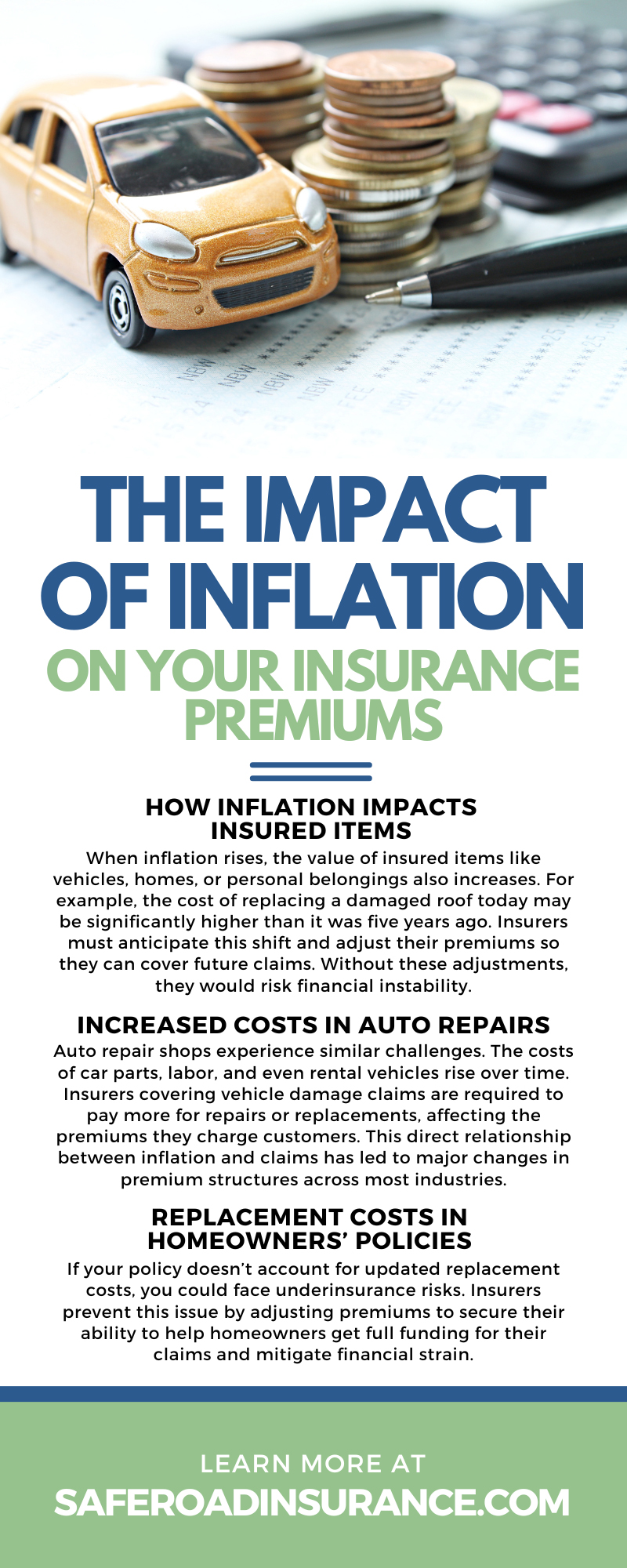
Inflation affects nearly every aspect of our financial lives, from groceries to housing. However, the impact of inflation on your insurance premiums is an area of discussion that often gets overlooked, but not anymore. This post will provide insights into rising premiums and what you can do about them to help you make informed decisions on your policies.
Inflation and Insurance
Inflation and insurance premiums are more tied together than most people realize. When inflation rates climb, the costs of goods and labor in the economy increase. For insurance companies, this means incurring additional costs to repair vehicles, rebuild properties, or cover medical expenses. These rising costs eventually trickle down to policyholders in the form of higher premiums.
Take auto insurance, for example. If claims involving car repairs spike due to increased material and labor costs, insurers will need to adjust their rates to maintain profitability. Similarly, for homeowners insurance, the costs to rebuild or repair homes rise when construction materials and services grow more expensive. Inflation amplifies these expenses across different coverage areas.
How Inflation Impacts Insured Items
When inflation rises, the value of insured items like vehicles, homes, or personal belongings also increases. For example, the cost of replacing a damaged roof today may be significantly higher than it was five years ago. Insurers must anticipate this shift and adjust their premiums so they can cover future claims. Without these adjustments, they would risk financial instability.
Consider motorcycle insurance in California as yet another example. With inflation driving up the costs of motorcycle repairs, parts, and labor across the state, insurers face higher claim payouts when accidents occur. Replacing a damaged engine or repairing bodywork may now cost substantially more due to increased material and service expenses.
Claims payouts are also influenced heavily by economic trends. Insurers calculate the anticipated costs of payouts and set premiums to align with these projections. Inflation introduces unpredictability into this equation by continually pushing up prices. To stay ahead, insurers increase premiums so they can meet policyholders’ needs without incurring insolvency risks.
Increased Costs in Auto Repairs
Auto repair shops experience similar challenges. The costs of car parts, labor, and even rental vehicles rise over time. Insurers covering vehicle damage claims are required to pay more for repairs or replacements, affecting the premiums they charge customers. This direct relationship between inflation and claims has led to major changes in premium structures across most industries.
For individuals, the growing prevalence of advanced vehicle features, like driver-assistance systems and electric components, further drives up repair costs. Coupled with inflation, these technological advancements create additional pressure for insurers to reassess pricing.
Replacement Costs in Homeowners’ Policies
Homeowners insurance, in particular, takes a huge hit during periods of inflation. Replacement costs, which represent the price of rebuilding or repairing your home, often rise due to inflation.
If your policy doesn’t account for updated replacement costs, you could face underinsurance risks. Insurers prevent this issue by adjusting premiums to secure their ability to help homeowners get full funding for their claims and mitigate financial strain.
Policyholders should regularly review their coverage to check that the replacement cost value accurately reflects the current worth of their property. Failing to do so could leave gaps that may jeopardize financial recovery in the event of damage.
Depending on your insurance needs, if there’s an option to add inflation protection coverage to your policy, it could be a smart choice. This protection coverage automatically increases your limits annually to account for inflation, helping you stay prepared for unforeseen price hikes.
Why Insurers Raise Premiums
While it may be frustrating to see your premiums rise, it’s important to understand that insurance companies rely on staying profitable to meet their obligations for your claims. Insurers operate in a delicate balance. They collect premiums, pay claims, and invest surplus funds to generate more revenue. During inflation, claims payouts rise sharply, and investment income often fluctuates due to changes in interest rates. By staying ahead of these market dynamics, insurers remain capable of meeting policyholders’ claims promptly and without interruption.
Mitigate Rising Premiums
The smartest way to get a jump on rising premiums is to shop around and compare quotes from various providers. Many insurers respond to inflation differently, and competitive alternatives exist.
A proactive approach is to bundle multiple policies, such as auto and homeowners insurance, to take advantage of discounts. If your insurer offers loyalty discounts, those can also help. Many insurers reward long-term customers with reduced rates, making it a win-win for you to stay consistent with your provider.
Determine whether you’re overinsured or paying for additional features you don’t truly need. Adjusting deductibles can also lower your monthly payments, as higher deductibles translate to lower premiums. If you raise your deductible, confirm that the amount is manageable for you in the event of a claim.
The Importance of Communication
The rising costs of premiums emphasize the importance of clear communication between insurers and policyholders. Many people may not understand why their rates increase or what they can do to mitigate the effects. Insurers should proactively explain the connection between inflation and premiums to help you prepare for these economic shifts.
Regular policy reviews are also an important part of ongoing communication. Meeting with your insurer to discuss adjustments or revisit policy terms means you’re adequately covered and thus unlikely to be caught by surprise. Building a transparent relationship helps you stay informed and make financially sound decisions.
The Next Steps
Inflation may be inevitable, but proactively monitoring your insurance policies can make all the difference. Review your coverage annually, understand how inflation affects your premiums, and explore ways to offset costs through discounts or bundling. Your insurer’s main goal is to protect you financially, so use the resources available to you to keep your coverage optimal and affordable.
If you’re ready to review your coverage or explore new options, reach out to us today at Saferoad Insurance. We’re here to support you through the impact of inflation on your insurance premiums with personalized guidance and access to a variety of policies at a price that works for you.
